Taiwan Startups Develop Plastics-Free Products
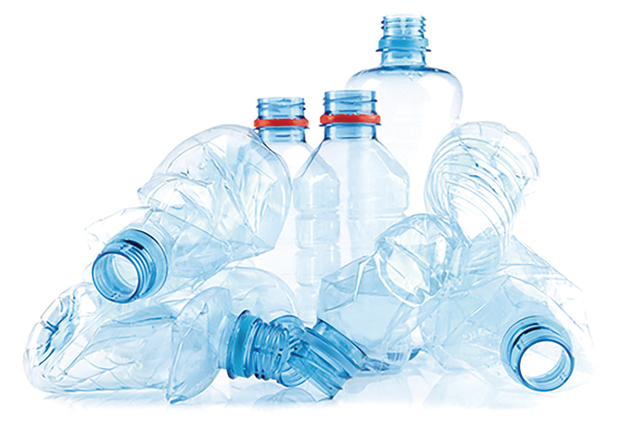
Source:AmCham Taipei’s Taiwan Business TOPICS
Several local startups are developing products aimed at reducing the massive amount of single-use plastics consumed on the island.
Views
Taiwan Startups Develop Plastics-Free Products
By AmCham Taipei’s Taiwan Business TOPICSweb only
Taiwan has a dismal recycling rate for single-use plastics. In fact, of the approximately 16 billion plastic bags that Taiwan goes through each year, fewer than 10% are recycled, says Jason Huang, co-founder of Re-Think, a not-for-profit organization that aims to protect Taiwan’s coastal and marine environments.
This is not entirely the fault of consumers, Huang points out. The quantity of retrievable plastic in such bags is often so small that those who collect or process recyclables for a living do not accept them. Taipei City Government’s Environmental Protection Bureau advises on its website that only clean, single-material bags can be recycled. Bags contaminated by oil or solids should be thrown out with general waste.
As part of its plan to get rid of all single-use plastic bags, straws, and beverage cups by 2030, Taiwan’s government has already banned supermarkets and convenience stores from giving out free plastic bags. Despite that restriction, each day millions of bags are used just once, usually to hold a food or drink item. Few individuals bring their own containers when buying cooked food. Others say they would, but most reusable containers are neither light nor compact.
“People understand that reducing plastics consumption is an important goal, but this is ‘a society of convenience,’” says Huang.
Lynn Kao and Will Chien, co-founders of Agooday, hold a similar view. They are trying to change people’s behavior by offering a novel product, the Pockeat reusable food-bag, which they launched after a wildly successful 2017 crowdfunding effort. Although the initial target was NT$1 million, they raised over NT$24 million. So far, they have sold more than 90,000 of the bags.
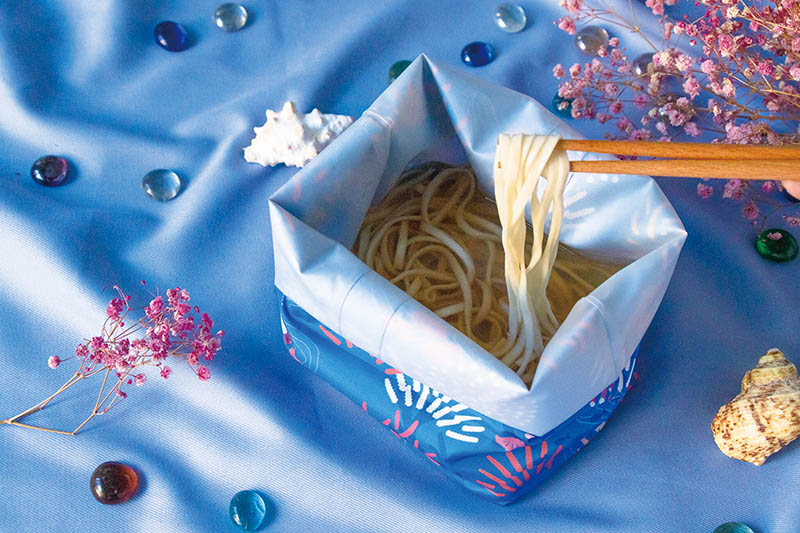 Agooday’s reusable food bag is available in a range of prints. (Source: Agooday)
Agooday’s reusable food bag is available in a range of prints. (Source: Agooday)
The Pockeat’s lining is waterproof, oil resistant, and heatproof up to 120°C. Curiously, this inner bag is made from food-grade TPU (thermoplastic polyurethane) – which cannot be recycled if contaminated by food – rather than recycled PET bottle fabric. Kao explains that current regulations do not allow recycled material to be used in the manufacturing of food containers.
The two-liter Pockeat, which retails for NT$640, weighs 40 grams. The NT$690 three-liter version weighs 47 grams. Both can be folded flat to fit inside a pocket or a handbag and feature Taiwan-centric designs, such as Jade Mountain, to attract customers.
“Compared to free plastic bags, people think the Pockeat is quite expensive, so we try to educate them about both the environmental cost of single-use bags and the health issues,” says Kao.
One reason for the Pockeat’s high price is Kao and Chien’s decision to source all materials and have all manufacturing done in Taiwan. “If we moved our production to China, we’d cut our costs in half, but we want the Pockeat to be made here to reduce the carbon footprint from factory to consumer and to better control the quality” says Kao.
Finding a willing and capable manufacturer was far from easy, she explains. Most factory owners are used to working with big buyers, so it took some time to convince them to work with Agooday.
They also ran into issues of quality. “The inner bags are manufactured by high frequency welding, and the factory didn’t QC every piece,” says Chien. “We found some with defects, so we had to change manufacturer and delay deliveries. It’s very important to us that we have good quality products for our customers.”
The company commissioned SGS to test the product and certify it as safe for storing hot and cold foods. Agooday has also published videos showing how the bags should be used, cleaned, and dried.
Kao claims the Pockeat lasts forever, and Agooday offers a repair service to extend the product’s life. There is a small charge to cover materials, labor, and shipping.
The Pockeat was not Agooday’s first product. In 2014, Kao and Chien devised a biodegradable alternative to the plastic toothbrush.
According to the company’s website, 100 million toothbrushes are thrown away in Taiwan each year, polluting ecosystems and eventually degrading into microplastics which enter the food chain. To trim this tide of waste, Agooday sells a toothbrush with a bamboo handle (coated with beeswax and flaxseed oil to prevent mold) and nylon bristles.
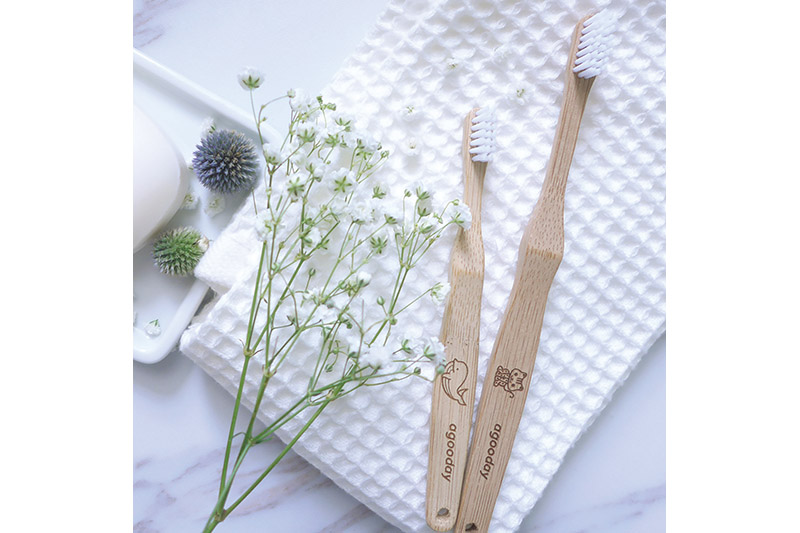 Agooday’s toothbrushes are made of bamboo and biobased nylon. (Source: Agooday)
Agooday’s toothbrushes are made of bamboo and biobased nylon. (Source: Agooday)
Agooday toothbrushes – like their plastic counterparts – have to be replaced every few months. Kao advises customers to dispose of them by plucking off and throwing the bristles in a trash can, then burying the handle in soil so it can decompose. The nylon is not biodegradable, but unlike conventional petroleum-based nylon, it is made from castor oil, which is a renewable resource.
The toothbrushes are made in China. “We’d like to keep our dental-products manufacturing in Taiwan, but honestly it’s very hard to find suitable factories here, as most of them have moved to China or Southeast Asia,” laments Kao.
Agooday’s plastic-free dental floss is made of silk. It is sold in a reusable bottle, while refills are packed in paper.
Like the founders of Agooday, James Chuang has examined Taiwanese lifestyles and seen ways to scale down plastics consumption. In 2017, he founded Helashuo Co., Ltd., which strives to make innovative products designed to limit plastic use under the LIve For Eco brand name.
“Here in Taiwan, many people ride scooters, and raincoats are in great demand, but they’re made from petrochemicals. That why we started with raincoats,” he says.
The outer layer of Helashuo’s raincoat, which accounts for more than 70% of its total weight, is pure cotton, which Chuang stresses is biodegradable. The waterproof inner layer is made of polyurethane (PU). Proponents of PU argue that it is preferable to most other plastics. It does not contain chemicals that interfere with the endocrine and hormone systems of humans and other creatures, nor does it influence PH levels in soil or water. It is also highly recyclable.
Biobased and biodegradable types of PU are available, but Helashuo uses petroleum-based PU. “Nobody wants to recycle and reuse this material, so our job is to reduce environmental impact by using cotton to cut petrochemicals consumption,” Chuang says.
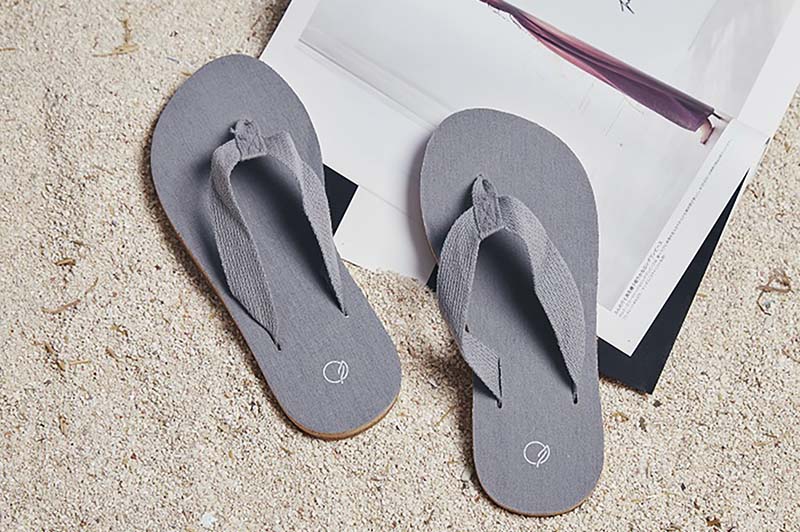 LIve For Eco’s flip-flops are made of cotton, cork, and natural raw rubber. (Source: Live For Eco / Helashuo)
LIve For Eco’s flip-flops are made of cotton, cork, and natural raw rubber. (Source: Live For Eco / Helashuo)
Helashuo is currently perfecting flip-flops made of cotton, cork, and natural raw rubber. “These natural materials aren’t water-resistant, but they’re suitable for use indoors, or outside in dry weather. Most importantly, they can all decompose naturally,” says Chuang. “We’re still doing market testing, and hope our new flip-flop can go on sale in 2021.”
Earlier this year, when Helashuo launched a range of child-sized raincoats, Chuang used Taiwanese crowdfunding platform zeczec.com to attract money and publicity. The campaign concluded on September 23 with pledges totaling just over NT$1.6 million. “Including marketing costs, we’ll need much more money to run this project,” Chuang says, adding that the money raised will go toward manufacturing the first batch of raincoats.
All LIve For Eco products are made in Taiwan, and Chuang admits that pricing is a major challenge. “Natural materials are more expensive than petrochemicals, and manufacturing in Taiwan is more expensive than in China or Vietnam,” he explains.
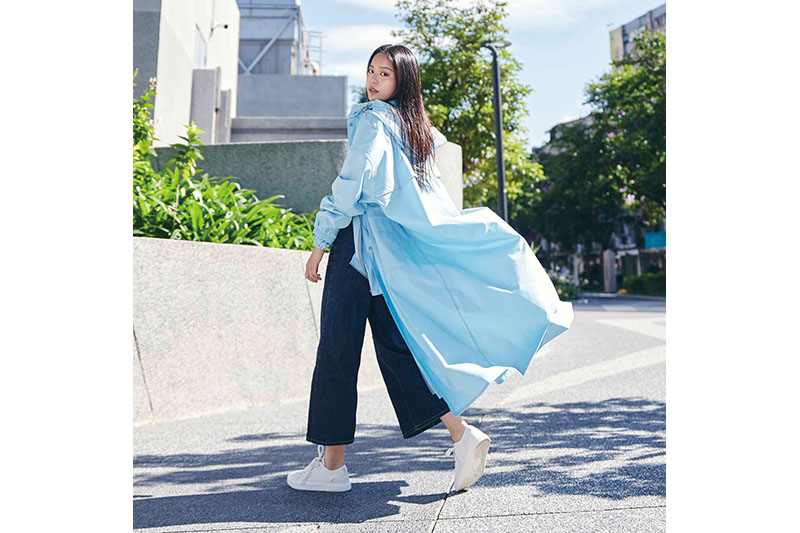 The LIve For Eco raincoat. (Source: LIve For Eco / Helashuo)
The LIve For Eco raincoat. (Source: LIve For Eco / Helashuo)
A LIve For Eco raincoat lasts just as long as ones made of conventional materials, says Chuang. They are, however, significantly more expensive. LIve For Eco’s prices may be more acceptable to consumers in countries where the standard is living is higher, Chuang says. For this reason, he expects to focus on developing overseas markets and children’s products. “We’re very interested in partnering with big companies, and we have the ability to customize our products, or even develop new ones, for them,” he adds.
Both Agooday and Helashuo have benefited from government help. The former received advice and financial support through the Ministry of Economic Affairs’ Service Industry Innovation Research and Development Program (SIIR), while the latter qualified for a Taipei City Startup subsidy of NT$700,000 in 2018.
Unlike the entrepreneurs behind Agooday and Helashuo, the founders of Uanuan can draw on decades of industrial experience. The brand’s name derives from the first part of the names of two factories established in the 1960s by James Wang’s grandfather. Wang is Uanuan’s creative director; his father is in charge of production.
Uanuan’s best-selling item, the Hiding Tumbler, is explicitly pitched as a solution to one of the Taiwanese public’s most polluting habits. The product description on Uanuan’s website notes that roadside kiosks sell an estimated 1.5 billion cups of tea and other beverages per year. Because only a small minority of customers bring their own containers, it is likely that the thirst for freshly-squeezed juices and pearl milk tea generates four million pieces of trash per day.
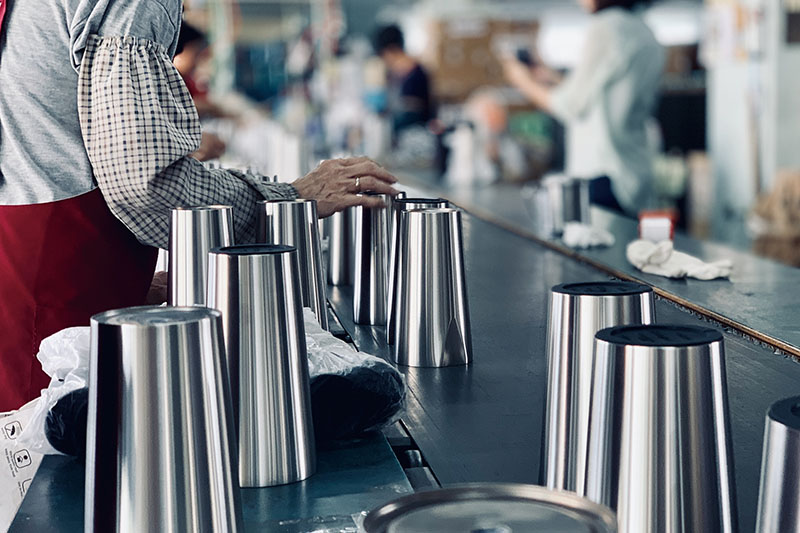 Hiding tumblers being manufactured at Uanuan’s factory in Tainan. (Source: Uanuan)
Hiding tumblers being manufactured at Uanuan’s factory in Tainan. (Source: Uanuan)
The Hiding Tumbler is a 750ml reusable cup made from double-layer stainless steel, in which iced drinks stay cold for up to 12 hours. When cold liquid is being carried on a sweltering day, no condensation forms on the exterior. Hot beverages keep their warmth for up to 8 hours. A unique selling point of the product, says James Wang, is that users can switch between a thin straw and a thicker one for drinks containing boba tapioca balls. The straws are made of Eastman Tritan copolyester and are supplied with the tumbler, as is a carrying bag made of recycled PET bottle fiber.
All manufacturing is performed by the company, but it has encountered a number of issues in this process. “Improving and sustaining the quality of our products has been the most important thing,” says Wang.
Uanuan’s website claims that if you use a Hiding Tumbler three or more times a week, in around half a year the environmental cost of manufacturing it will be canceled out by the quantity of plastic you will have avoided using. To avoid cups being thrown out due to parts breaking, Uanuan offers replacement straws, lids, and other components through its website.
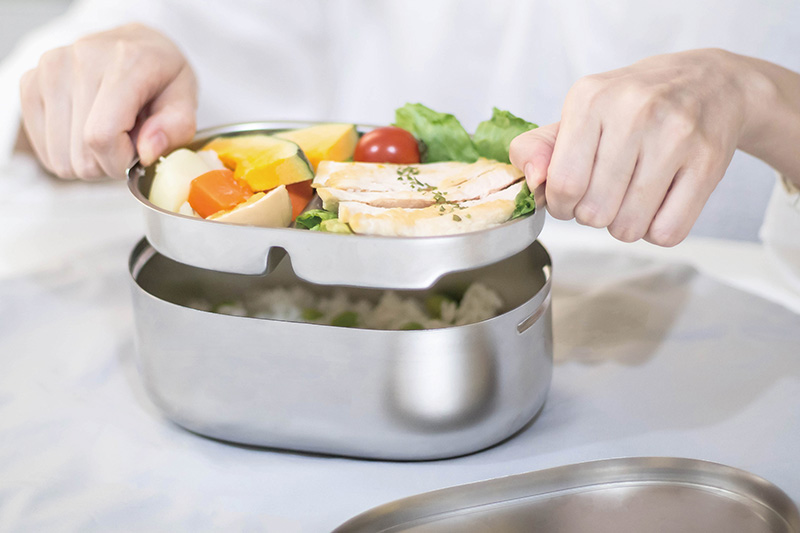 Uanuan’s stainless-steel lunchbox, the Bendong. (Source: Uanuan)
Uanuan’s stainless-steel lunchbox, the Bendong. (Source: Uanuan)
About 75% of Uanuan’s sales are through online stores. The brand is now sold in Hong Kong, Macao, and South Korea, and is in the process of entering the Japanese market. Yet Wang says there is no rush to expand internationally; the company would prefer to first become more established in Taiwan. That way, “more Taiwanese can know who we are, love what we do and what we make, and share our beliefs,” he says.
Jason Huang of Re-Think says that more people now understand the importance of curtailing the use of plastic, but “behavior hasn’t changed much, and total plastics production isn’t falling.” The popularity of online shopping and food-delivery apps have pushed up the amount of plastic discarded by households, he says.
Huang warns that if plastic use is not put in check soon, “the landfills where incinerator ash is dumped will soon fill up.” Finding new landfill sites is exceptionally difficult, he adds, because as soon as a location is proposed, those living nearby protest.
The Environmental Protection Administration is working with vendors to try to figure out how to reduce single-use packaging, yet Huang complains that government policies are sometimes watered down when they run into opposition. Asked if the 2030 target can be met, he says: “I’m not sure how it’ll go.”
This article, written by Steven Crook, first appeared in Taiwan Business TOPICS magazine, the monthly publication of the American Chamber of Commerce in Taipei. It is republished here with permission from the publisher.
Have you read?
♦ The Nonagenarian Taiwan Billionaire Pioneering Biodegradable Plastics
♦ Looking for Eco-friendly PET Bottles? Call Taiwan
♦ How Can Solar Power Arrays Co-exist with Nature?
Uploaded by Penny Chiang






